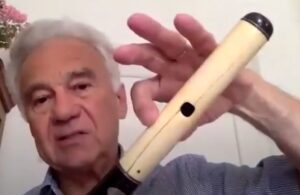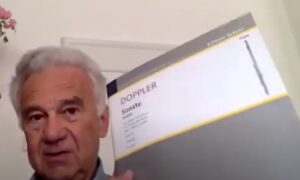András Adorján and Classical Archives’ Editor in Chief Barry Lenson discuss the new CD Doppler Discoveries, now available in the Classical Archives library for members to enjoy
Have you heard music composed by Franz Doppler and his brother Carl? If not, we predict it will soon become part of your regular listening. And now, you can explore their works on Doppler Discoveries, a new recording from Farao Classics. The stellar performers are flutists András Adorján and Emmanuel Pahud, joined by pianist Jan Philip Schulze and the Arcis Hornquintett.
About Doppler Discoveries
Franz Doppler (1821-1883) was a composer who is best known today for the music he wrote for the instrument he played and loved – the flute. His brother Carl Doppler (1825-1900) was a flute virtuoso as well and an extremely competent, if slightly less prolific, composer. They were born in Lviv but moved to Budapest while they were still students. There, they became important figures in the city’s musical life. They were among the founders of the Hungarian Philharmonic Orchestra and toured and concertized throughout Europe. Franz composed successful operas and later became a professor of flute at the Vienna Conservatory.
In the years since, history has relegated the brothers to the role of “flute composers.” And their larger and more ambitious works have been somewhat marginalized and under-performed.
But now, thanks to “Doppler Discoveries” a new CD that has just been released by Farao Classics, the music of the brothers is poised to reclaim its rightful place in the music of the nineteenth century. Part of the reason for this resurgence will be the excellence of the performances on this new disk by the flute virtuoso András Adorján and another star flutist, Emmanuel Pahud.

András holds Franz Doppler’s flute
A Letter in the Files Leads to an Important Doppler Discovery
“In my life,” András Adorján tells Barry Lenson, “I have been quite occupied from time to time with these brothers.”
Then in the last four or five years, András became something of a musicologist and discovered some pieces by the brothers that had never been published. In the archives of B. Schott’s Söhne, the music publisher headquartered in Mainz, he found not only manuscripts written by the brothers, but a letter that Franz had written to the publisher and a complete manuscript of a full, three-movement sonata for flute and piano – a work that until then had been considered lost.
András Adorján has not only recorded this work, he has also edited a new print edition. “I didn’t want to keep this music to myself, so I published it,” András Adorján tells Classical Archives. “The music is charming, happy! Many times, colored by a Hungarian flavor.”
And now, thanks to this wonderful new recording, we can all discover more music that was written by these composers.
The music composed by the Doppler brothers is a discovery in the truest sense of the word! Thanks to András Adorján and Emmanuel Pahud for bringing the wonderful works of the Doppler brothers into the light of day.

András holds a copy of his new edition of Franz Doppler’s Andante and Rondo
About András Adorján

For the cover of their new CD, Farao Classics placed the heads of András Adorján (left) and Emmanuel Pahud (right) onto a historical photo of the actual Doppler brothers. Click on the cover to explore this vibrant new CD in the Classical Archives library.
One of the world’s greatest flautists, András Adorján was born in Budapest. He grew up in Copenhagen, and has lived in Munich since 1974. He first studied dentistry, obtaining his dentist’s diploma in Copenhagen in 1968. He studied flute in Budapest with Vilmos Bántai, in Copenhagen with Johan Bentzon of the Danish Radio Orchestra, and later with Erik Thomsen of the Danish Opera and completed his musical studies under Jean-Pierre Rampal (International Summer Academy in Nice) and Aurèle Nicolet at the Musikhochshule in Freiburg, Germany.
After winning two international prizes in 1968—the Jacob Gade Prize in Copenhagen and the Concours International de Flûte in Montreux—Adorján was unanimously awarded the Premier Grand Prix of the Concours International de Flûte de Paris in 1971. This marked the beginning of an international career that has led him to appear worldwide as soloist with the best chamber and symphony orchestras.
Between 1970 and 1988, Adorján’s activities included the position of principal flutist of important symphony orchestras: the Royal Stockholm Opera, the Gürzenich Orchestra of Cologne, the Southwest German Radio Symphony Orchestra of Baden-Baden, and from 1974 to 1987 the Bavarian Radio Symphony Orchestra in Munich. In 1987 he was appointed professor at the Musikhochschule in Cologne, and from 1996 to 2012, he taught at the Musikhochschule in Munich. Many of his pupils have gone on to successful careers as flutists, teachers, and conductors.
Adorján is a welcome guest at important music festivals and a sought-after member of juries for international flute competitions. He is active in widening the flute literature by playing many works from a variety of stylistic periods. He performs pieces he has (re)discovered by composers including Benda, Bloch, Danzi, Devienne, Doppler, Doráti, Gieseking, Hummel, Lebrun, Mendelssohn, Mercadante, Moscheles, Reger, Reinecke, Roman, Silcher, Spohr, Zielche, and Zinck. He also plays compositions by contemporary composers that were inspired by and written for him, among them Dieter Acker, Georges Barboteu, Gunnar Berg, Edison Denisov, Paul Engel, Jindrich Feld, Ferenc Farkas, Lars Graugård, Wilfried Hiller, Vagn Holmboe, Jan Koetsier, Noël Lee, Miklós Maros, Krzysztof Meyer, Alfred Schnittke, Sven Erik Werner, and Jörg Widmann. An active music editor, he has edited many works for Bärenreiter, Billaudot, Breitkopf, Henle, Musica Rara, Schott, Sikorski, and Edition Svitzer.
Adorján is the co-editor of the 900-page encyclopedia, Lexikon der Flöte (Lexicon of the Flute), published in 2009. He has released more than 100 records and CDs and received the 1988 Prize of the Deutsche Schallplattenkritik (German Recording Critics). His recordings include the complete flute concertos of Benda, Danzi, Devienne and C.P.E. Bach as well as Mendelssohn’s Violin Concerto (Popp transcription) and duo recordings with Jean-Pierre Rampal. His latest recordings, released by the French label Premiers Horizons, include Capriccio Danois (first recordings of Danish music for flute and piano from the beginning of the 20th century) and six concertos of Ludwig August Lebrun coupled with Haydn’s Cello Concerto in D (all Ebers transcriptions) with the Orchestre de Chambre de Paris conducted by Philippe Bernold. He also has performed and recorded with his musical family, including his wife Marianne Henkel (flute), and sons Dávid (cello) and Gabriel (violin).
About Emmanuel Pahud
French and Swiss flautist Emmanuel Pahud began studying music at the age of six. He graduated in 1990 with the 1er Prix from the Paris Conservatoire, and went on studying with Aurèle Nicolet. He won 1st Prize at the Duino, Kobe and Geneva Competitions, and at age 22 Emmanuel joined the Berliner Philharmoniker as Principal Flute under Claudio Abbado, a position which he still holds today. In addition, he enjoys an extensive international career as soloist and chamber musician.
Emmanuel appears regularly at prominent concert series, festivals and orchestras worldwide, and has collaborated as a soloist with leading conductors such as Abbado, Antonini, Barenboim, Boulez, Fischer, Gergiev, Gardiner, Harding, Järvi, Maazel, Nézét-Séguin, Orozco-Estrada, Perlman, Pinnock, Rattle, Rostropovich, Zinman.
Emmanuel is a dedicated chamber musician and regularly gives recitals with pianists Eric Le Sage, Alessio Bax, Yefim Bronfman, Hélène Grimaud, Stephen Kovacevich, as well as jazzing with Jacky Terrasson. In 1993, Emmanuel founded the Summer Music Festival in Salon de Provence together with Eric Le Sage and Paul Meyer, which is still a unique chamber music festival today. He also continues chamber music performances and recordings with “Les Vents Français”, one of the premiere wind quintets featuring François Leleux, Paul Meyer, Gilbert Audin and Radovan Vlatkovic.
He is committed to expanding the flute repertoire and commissions new flute works every year to composers such as Elliott Carter, Marc-André Dalbavie, Thierry Escaich, Toshio Hosokawa, Michaël Jarrell, Philippe Manoury, Matthias Pintscher, Christian Rivet, Eric Montalbetti and Luca Francesconi.
Since 1996, Emmanuel has recorded 40 albums exclusively for EMI / Warner Classics, which all have received unanimous critical acclaim and awards, resulting in one of the most significant contributions to recorded flute music.
Emmanuel was honoured to receive the Chevalier dans l’Ordre des Arts et des Lettres for his contribution to music, and is HonRAM of the Royal Academy of Music. He also is an Ambassador for Unicef.
About Jan Philip Schulze
Renowned pianist Jan Philip Schulze partners with András Adorján and Emmanuel Pahud on Doppler Discoveries. In addition to joining them in the performances, he served as editor for the Doppler works, adding to and editing the piano parts where necessary.
Mr. Schulze has had a particularly varied career which has taken him regularly to the great stages of Europe and Asia as a song accompanist, chamber musician and specialist in new music. His musical collaborators have included Juliane Banse, Annette Dasch, Rachel Harnisch, Dietrich Henschel, Christiane Iven, Jonas Kaufmann, Johan Reuter, Robert Dean Smith, Sarah Maria Sun, and Violeta Urmana.
He has premiered numerous works and worked closely for years with the composers Hans Werner Henze, Wolfgang Rihm, Dieter Schnebel, Jörg Widmann, Manfred Trojahn, Nikolaus Brass, and many others, as well as performing piano concertos by Xenakis, Staude and Schöllhorn with the BR and WDR symphony orchestras.
Filled with a thirst for discovery, he has recorded an extensive and diverse discography in recent years that includes works by Jörg Widmann, Hans Werner Henze, and Hindemith, among others.
Recent Comments